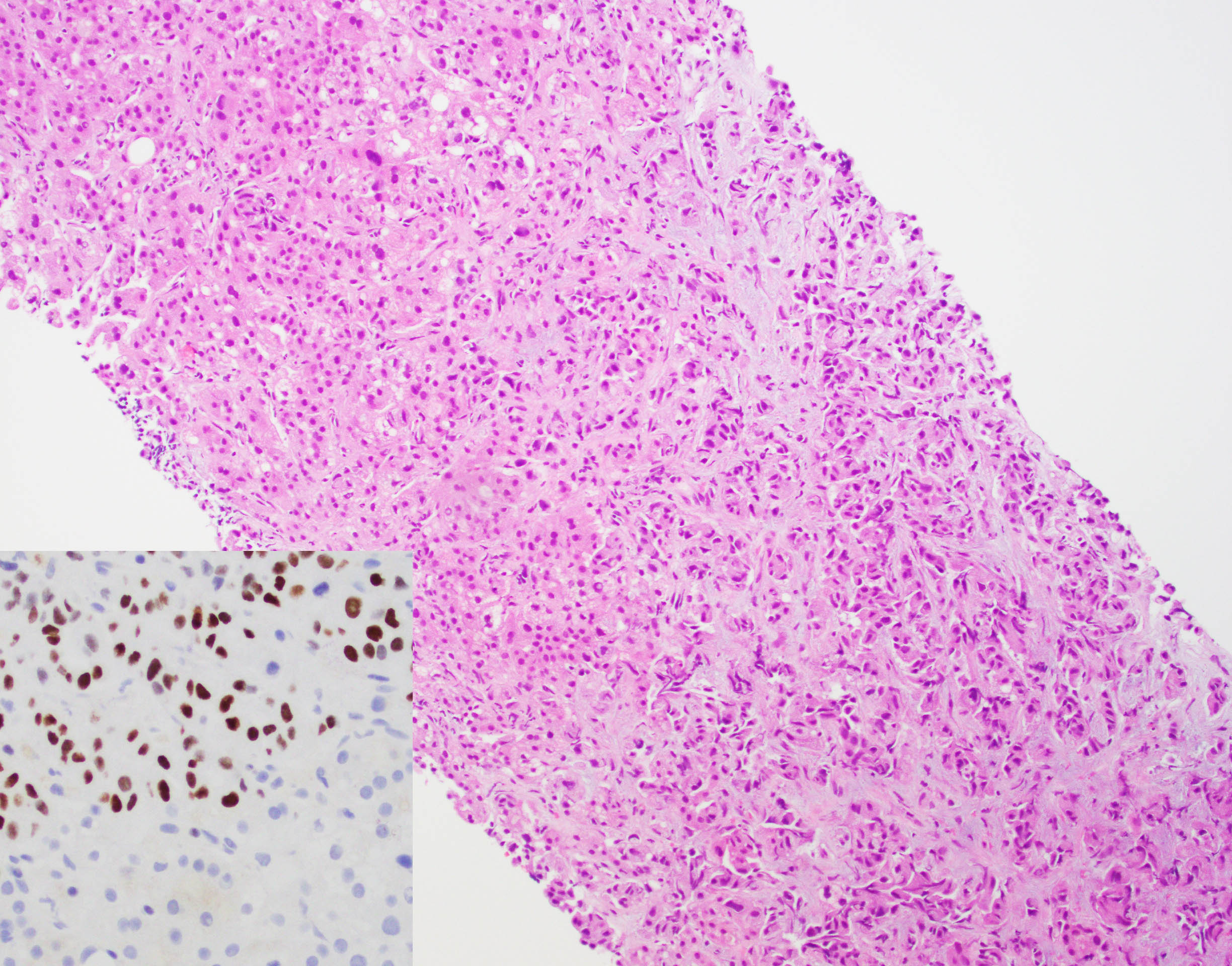Tuesday Poster Session
Category: Liver
P6131 - A Case of Rapidly Progressive Acute Liver Failure Due to Metastatic Breast Adenocarcinoma in a Young Woman Without Risk Factors
Tuesday, October 28, 2025
10:30 AM - 4:00 PM PDT
Location: Exhibit Hall

Olivia Becker, MD
University of Virginia Medical Center
Charlottesville, VA
Presenting Author(s)
Olivia Becker, MD, Deepika Suresh, MD, Edward Stelow, MD, Nicolas Intagliata, MD
University of Virginia Medical Center, Charlottesville, VA
Introduction: This case demonstrates a rare and diagnostically challenging case of acute liver failure related to metastatic breast cancer in a young, previously healthy female. It highlights the importance of considering malignancy as a cause of acute liver failure (ALF) in young patients.
Case Description/
Methods: A 37-year-old female with no past medical history presented with two weeks of vomiting and jaundice. She had abdominal distention and scleral icterus but no evidence of chronic liver disease on exam. Laboratory evaluation revealed a new mixed liver injury with elevated INR. Imaging showed nodular changes. She was discharged but returned with dyspnea and was found to have an elevated INR of 2.4 and altered mental status concerning for ALF. She was transferred to our center for liver transplant evaluation. Extensive serologic workup was negative and she denied alcohol, illicit drug use, or use of any culprit medications. Magnetic resonance imaging of her liver demonstrated heterogeneous enhancement concerning for severe liver inflammation and multiple new thoracolumbar spinal lesions. During her hospitalization, she required intensive care for an acute kidney injury requiring renal replacement therapy and acute hypoxic respiratory failure requiring intubation secondary to volume overload, hospital acquired pneumonia, and acute respiratory distress syndrome. Liver biopsy was reviewed and demonstrated infiltrative triple positive metastatic adenocarcinoma suspicious for breast cancer. She denied any family history of breast cancer or other malignancy. She had not yet had a mammogram due to her age but did follow with her primary care provider regularly and was up to date with routine healthcare maintenance. She was started on trastuzumab and pertuzumab and later carboplatin once her clinical status improved. She was discharged with oncology and hepatology follow-up and now has improved liver function tests with good response to therapy.
Discussion: The etiology of this patient’s acute liver failure proved difficult to diagnose given her age, lack of risk factors, and rapid progression. While she ultimately was not deemed a liver transplant candidate due to her metastatic stage IV cancer, she was able to initiate treatment to extend her life and improve liver function. This case underscores the importance of keeping a broad differential for acute liver failure and utilizing liver biopsy in the case of diagnostic uncertainty.

Figure: Core biopsy of the liver showing non-neoplastic hepatocytes (upper left half) and infiltrating carcinoma (lower right half) (H&E, x100). Inset shows GATA3 immunostain highlighting metastatic breast carcinoma (x200).
Disclosures:
Olivia Becker indicated no relevant financial relationships.
Deepika Suresh indicated no relevant financial relationships.
Edward Stelow indicated no relevant financial relationships.
Nicolas Intagliata indicated no relevant financial relationships.
Olivia Becker, MD, Deepika Suresh, MD, Edward Stelow, MD, Nicolas Intagliata, MD. P6131 - A Case of Rapidly Progressive Acute Liver Failure Due to Metastatic Breast Adenocarcinoma in a Young Woman Without Risk Factors, ACG 2025 Annual Scientific Meeting Abstracts. Phoenix, AZ: American College of Gastroenterology.
University of Virginia Medical Center, Charlottesville, VA
Introduction: This case demonstrates a rare and diagnostically challenging case of acute liver failure related to metastatic breast cancer in a young, previously healthy female. It highlights the importance of considering malignancy as a cause of acute liver failure (ALF) in young patients.
Case Description/
Methods: A 37-year-old female with no past medical history presented with two weeks of vomiting and jaundice. She had abdominal distention and scleral icterus but no evidence of chronic liver disease on exam. Laboratory evaluation revealed a new mixed liver injury with elevated INR. Imaging showed nodular changes. She was discharged but returned with dyspnea and was found to have an elevated INR of 2.4 and altered mental status concerning for ALF. She was transferred to our center for liver transplant evaluation. Extensive serologic workup was negative and she denied alcohol, illicit drug use, or use of any culprit medications. Magnetic resonance imaging of her liver demonstrated heterogeneous enhancement concerning for severe liver inflammation and multiple new thoracolumbar spinal lesions. During her hospitalization, she required intensive care for an acute kidney injury requiring renal replacement therapy and acute hypoxic respiratory failure requiring intubation secondary to volume overload, hospital acquired pneumonia, and acute respiratory distress syndrome. Liver biopsy was reviewed and demonstrated infiltrative triple positive metastatic adenocarcinoma suspicious for breast cancer. She denied any family history of breast cancer or other malignancy. She had not yet had a mammogram due to her age but did follow with her primary care provider regularly and was up to date with routine healthcare maintenance. She was started on trastuzumab and pertuzumab and later carboplatin once her clinical status improved. She was discharged with oncology and hepatology follow-up and now has improved liver function tests with good response to therapy.
Discussion: The etiology of this patient’s acute liver failure proved difficult to diagnose given her age, lack of risk factors, and rapid progression. While she ultimately was not deemed a liver transplant candidate due to her metastatic stage IV cancer, she was able to initiate treatment to extend her life and improve liver function. This case underscores the importance of keeping a broad differential for acute liver failure and utilizing liver biopsy in the case of diagnostic uncertainty.

Figure: Core biopsy of the liver showing non-neoplastic hepatocytes (upper left half) and infiltrating carcinoma (lower right half) (H&E, x100). Inset shows GATA3 immunostain highlighting metastatic breast carcinoma (x200).
Disclosures:
Olivia Becker indicated no relevant financial relationships.
Deepika Suresh indicated no relevant financial relationships.
Edward Stelow indicated no relevant financial relationships.
Nicolas Intagliata indicated no relevant financial relationships.
Olivia Becker, MD, Deepika Suresh, MD, Edward Stelow, MD, Nicolas Intagliata, MD. P6131 - A Case of Rapidly Progressive Acute Liver Failure Due to Metastatic Breast Adenocarcinoma in a Young Woman Without Risk Factors, ACG 2025 Annual Scientific Meeting Abstracts. Phoenix, AZ: American College of Gastroenterology.
